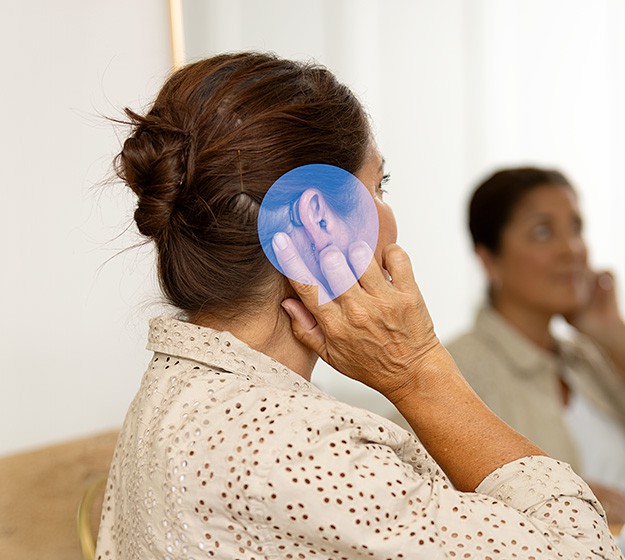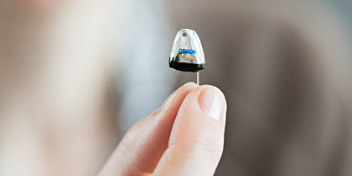Find out more about Oticon Zeal

Signs and symptoms of hearing loss
Learn what the signs of hearing loss are and how to take action.
6 early signs of hearing loss
Knowing what the signs are can help you take steps towards improving your hearing.
Hearing loss

Self-assessment: Do I need a hearing test?
Just answer the four questions below to see whether you should consider getting a hearing test.
Your Result:
You would benefit from a hearing test
Your answers indicate that you experience symptoms of hearing loss. We strongly recommend booking a hearing test in one of our clinics.
The result is an indication. An in-person hearing test can determine if you have a hearing loss.
Book your free hearing test:
Your Result:
It seems you’d benefit from a hearing test
Your answers indicate that you experience some symptoms of hearing loss. We recommend booking a hearing test in one of our clinics.
The result is an indication. An in-person hearing test can determine if you have a hearing loss.
Book your free hearing test:
Your Result:
It cannot be determined whether you’d benefit from a hearing test
Your answers do not indicate that you experience symptoms of hearing loss. However, if you experience trouble hearing, we recommend booking a hearing test in one of our clinics.
The result is an indication. An in-person hearing test can determine if you have a hearing loss.
Book your free hearing test:
Pay attention to early symptoms of hearing loss
Hearing loss often occurs gradually, so it may be difficult to notice when your hearing begins to decline. Your friends and family might even notice it before you do.
Knowing what the signs and symptoms of hearing loss are means you can get treatment early and reap the benefits of better hearing. When you visit a local Hidden Hearing clinic for an in-depth hearing evaluation, one of our experts will identify your level of hearing ability. They'll then recommend the best treatment option for your hearing needs.
Take online hearing test Hearing loss types

Early recognition could improve your quality of life
- Missing out on conversations with loved ones, friends, and colleagues each day
- Feeling left out or unable to hear during social events
- Feelings of isolation or depression
Types of hearing loss: Signs and symptoms
The most common type of hearing loss is sensorineural hearing loss. It's usually caused by the natural ageing process and/or extensive exposure to loud noises. Understanding the difference between sensorineural and other types of hearing loss will give you an idea of the best treatment options available.
| Signs of sensorineural hearing loss |
Signs of conductive hearing loss | Signs of sudden hearing loss |
| Difficulty following conversations involving more than two people | Speech and other sounds seem distant or muffled | Unexplained rapid loss of hearing |
| Difficulty following conversation when there’s background noise | Pain, pressure in – or discharge from – the ear | Loss of hearing all at once or over a couple of days |
| Difficulty understanding people on the phone | A feeling of “fullness” in the ear | Almost always experienced in just one ear |
| Sounds seem unclear or people sound like they're mumbling | Sounds seem quieter (but aren't distorted) | Vertigo |
| Difficulty hearing high-pitched sounds | ||
| Ringing or buzzing in the ears (tinnitus) |
| Sudden hearing loss: seek help immediately If you experience sudden hearing loss, you should seek medical attention immediately. |
Levels of hearing loss
Hearing loss can be categorized by severity level. Your level of hearing ability is measured in decibels hearing level (dB HL), referring to how loud sounds need to be for you to hear them.
Hearing loss levels

Hearing loss treatment options
Fortunately, there's a wealth of hearing loss treatments available to suit all types of hearing loss needs.
The most common and likely treatment for hearing loss is wearing hearing aids. In some cases, a cochlear implant (CI) or bone-anchored hearing aid (BAHA) might be recommended. Surgery or other medical solutions are also options for other cases.
But whatever the best treatment option for you is, the sooner you seek help, the better your outcome will be.
Book a free hearing test Hearing loss treatment
3 reasons to book a test with Hidden Hearing
1
2
3

Get a free hearing test with one of the UK's largest hearing care specialists

Did you know?
Today’s hearing aids are more technologically advanced and smaller than ever.
Some of them are practically invisible. But despite their small size, they give excellent sound quality – even in difficult listening scenarios.















